Contents
Market Overview
Brexit negotiations are set to dominate weekend news-flow. The disconnect between GBP trading up to 1.35 and Brexit negotiations continues to surprise market participants, leaving an uneven downside risk should a deal not be secured by year-end. Needless to say, we anticipate a low spillover into EM markets, but continue to keep a watchful eye on such events. We also look for closure on U.S. fiscal and stopgap measures into the weekend, which could trigger further volatility in U.S. rates. As 2s10s backed up to 80bp and 10s30s remained steady at 74bp, expectations still point to steeper curves. This is hardly a foregone conclusion as the Fed balance sheet continues to expand to a new high of $7.4tn this week. Powell has at least done his best to ensure that the chips are still on the table until “substantial further progress” has been made with maximum employment and price stability. However, as far as pandemic monetary stimulus is concerned, only four facilities have been extended to March with the corporate credit facilities expiring on December 31st, which risks diluting the liquidity backstop in U.S. credit markets. The debate around inflation still remains ambiguous, but the Fed’s 2023 projections shifted higher, sending 5y5y swaps to 2.32% and U.S. breakevens to 1.94%. The ending result is that 10yr real rates are now back below -100bp again. Elsewhere, the EUR was in focus with the rise above 1.22, and peripheral Eurozone spreads continued to rally. The Italian 10yr spread over German bunds now sits at 111bp (4yr tights), as Italian rates hit an all-time low of 51bp. Nevertheless, it was another strong week for EM markets, with EM Sovereigns up 0.6% (4.9% YTD) and EM Corporates up 0.3% (6.9% YTD). Within EM Credit, Turkey, Georgia and Ethiopia outperformed, while Lebanon, Sri Lanka and Serbia lagged. Generally, we have seen oil-related credits outperform with crude oil now up 16% over the past four weeks, adding some comfort with copper trading close to $8000/t. Turkey is otherwise the clear outperformer with a series of orthodox statements from the new CBRT governor, who is set to chair his second MPC next Thursday.
Data releases over the next fortnight remain light, although the main spectacle sits with Turkey’s Central Bank rate decision on December 24th. Sell-side consensus points toward a 150bp hike from 15%. This will then be followed by the trade deficit release on December 31st. We will also have rate decisions out of China (3.85%), Egypt (8.25%) and Thailand (0.50%). China will also report manufacturing and service PMIs, although the manufacturing data is expected to taper from the November high print. We can then expect inflation prints out of Colombia, Hong Kong, Mexico, Peru and South Korea, followed by 3Q current account data out of Argentina.
Fixed Income
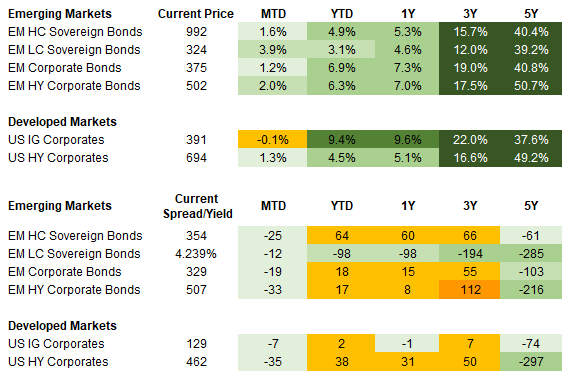
Equities
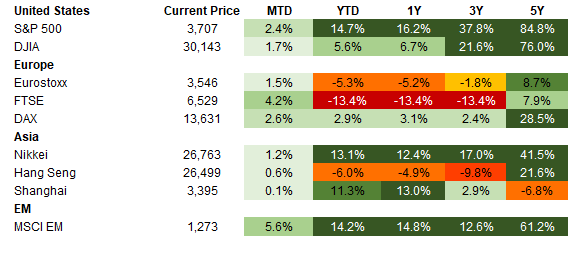
Commodities

Source for data tables: Bloomberg, JPMorgan, Gramercy. EM Fixed Income is represented by the following JPMorgan Indicies: EMBI Global, GBI-EM Global Diversified, CEMBI Broad Diversified and CEMBI Broad High Yield. DM Fixed Income is represented by the JPMorgan JULI Total Return Index and Domestic High Yield Index. Fixed Income, Equity and Commodity data is as of December 18, 2020 (Mid Afternoon).
Emerging Markets Weekly Highlights
Symbolic U.S. sanctions over S-400 and a hawkish Central Bank provide further support to shifting market sentiment on Turkey, Ecuador’s national assembly approves an anti-corruption law unlocking a $2bn IMF disbursement, South Korea, a previous model for COVID-19 policy success, faces potential for a full lockdown, Fitch revises Peru’s sovereign rating outlook to negative, Global emerging market corporates in focus: Living in the shadow of sanctions
Symbolic U.S. sanctions over S-400 and a hawkish Central Bank provide further support to shifting market sentiment on Turkey
Event: The outgoing Trump Administration announced mild sanctions on Turkey under CAATSA (Countering America’s Adversaries Through Sanctions Act) over Ankara’s acquisition of the Russian S-400 air-defense system. Meanwhile, the new leadership of the Central Bank of Turkey (CBRT) reiterated a strong market-friendly message on fighting inflation and maintaining tight monetary policy during a video conference by new governor, Naci Agbal.
Gramercy commentary: Governor Agbal’s comments this week confirm our view (which we have written about extensively in recent weeks) that the direction of travel by the new economic team appointed by President Erdogan in November will continue to be toward further tightening of the economic policy mix, which is the “bitter pill” that the Turkish economy needs. The ongoing U-turn toward market-friendly economic policy, which appears to enjoy Erdogan’s tacit approval at the moment, will continue to support Turkish assets, especially the TRY. We expect that the CBRT will deliver another material interest rate hike next week, dispelling any lingering market skepticism around the Central Bank’s willingness and ability to tighten monetary policy. Importantly, if onshore real interest rates finally reach attractive positive levels (3%+), this should provide sufficient incentive for local savers to start de-dollarizing, which we see as the key driver of currency performance going forward. Against a backdrop of constructive idiosyncratic factors, still significant fundamental undervaluation, and a benign top-down environment for EMFX with still ample catch-up potential, we believe that the TRY is set to outperform peers in 1Q 2021. In addition, recent news flow on a structural market concern – the risk of economically damaging sanctions by the U.S. and/or EU– has also been credit positive. At the EU level, consensus over “punishing” Ankara for its behavior in the Eastern Mediterranean remains elusive, which informs our view that market-disruptive sanctions are highly unlikely any time soon. For its part, the CAATSA sanctions imposed by the Trump Administration should be seen as a “best case” scenario for Turkey from at least two perspectives. First, they are the mildest possible five options from a list of 12 measures that the Administration could pick and second, they resolve uncertainty over the long-standing S-400 issue, offering the incoming Biden Administration an opening for a diplomatic reset with Erdogan’s Turkey.
Ecuador’s national assembly approves an anti-corruption law unlocking a $2bn IMF disbursement
Event: The Ecuadorian national assembly overwhelmingly approved an anti-corruption bill (127 votes from 130 in favor), which was the final requirement for unlocking a sizable $2bn disbursement under Ecuador’s $4.5bn IMF program.
Gramercy commentary: A timely inflow of $2bn (around 2% of GDP) is material for Ecuador’s dollarized economy that has been battered by COVID-19 and the stress of undergoing a sovereign debt restructuring earlier this year. The IMF’s disbursement will alleviate liquidity pressures for the government and the overall economy in the final run-up to crucial presidential and parliamentary elections scheduled for February 2021, with a potential presidential runoff in April. Market favorite candidate, Guillermo Lasso, continues to lead the polls, but he is unlikely to reach the required margin to win outright in the first round. As such, a second round, most likely against a populist candidate supported by former president Correa, is likely and highly unpredictable. The binary nature of the upcoming elections in terms of economic policy outcomes over the medium-term is the main market risk on the horizon. Political risk notwithstanding, we believe Ecuador is well positioned to take advantage of the likely global recovery in 2021. The government received material liquidity relief as a result of its successful debt restructuring earlier this year, making market debt service very manageable over the medium-term. In addition, the main macro themes that we expect to characterize next year – weak USD, higher oil prices and a general risk-on environment for HY EM credit, will all provide tailwinds for Ecuador. Last but not least, although economic policy, reform momentum and the IMF relationship will likely exhibit very different dynamics depending on who wins the presidency next year, we remain of the view that even a populist administration will be forced to be pragmatic and cooperate with the IMF in order to preserve Ecuador’s most important ad cherished institution – dollarization.
South Korea, a previous model for COVID-19 policy success, faces potential for a full lockdown
Event: COVID-19 cases have surged in South Korea in recent weeks, hindering the nascent recovery in the domestic economy. This surge is worse than the second wave that occurred in August and September, with a seven-day rolling average of 800 new cases, compared with a high of 350 back in September. On December 8th, the government raised restrictions to level 2.5 in Seoul, the second highest level of restrictions under the Korean five-tier social distancing measures. This level bans gatherings of 50 or more people, closes indoor concerts, gyms, and nightclubs, and limits restaurants from operating past 9 pm. The tighter measures are to remain in place until the end of the year.
Gramercy commentary: The surge in Korea, which had thus far successfully controlled the virus spread, highlights the challenges local authorities face in dealing with the virus. The government has resisted raising restrictions to level 3 (the highest level), given the potentially large negative economic impact (some estimate a 4-week, level 3 lockdown could result in a 2021 contraction of 2%) but may be forced to take action if new daily cases do not improve. This calls into question the potential need for other countries to do the same in the backdrop of new outbreaks. Importantly for EM top-down growth implications, China activity and virus data remain in check. To the extent this changes in a material way in 1Q, EM would likely face a bumpier road to economic recovery than currently assumed by markets.
Fitch revises Peru’s sovereign rating outlook to negative
Event: This week, Fitch revised Peru’s BBB+ sovereign rating outlook to negative, reflecting the country’s weakened government balance sheet, increasing uncertainty regarding Peru’s political trajectory in recent months, and Fitch’s expectation that Peru will face continuing challenges in reducing fiscal deficits.
Gramercy commentary: Fitch’s downgrade aligns with our expectations that Peru’s credit quality would deteriorate as a result of the many challenges the country has faced in the past few months. The political turmoil (Vizcarra’s impeachment), increased social unrest, growing influence of populist members of Congress ahead of the spring elections, and weaker fiscal outlook due to COVID-19 will likely continue to weigh on Peru’s credit trajectory. We expect that political divisions will inhibit policymaking and COVID-19 management in the near-term and we continue to monitor dollarization trends in the backdrop of ongoing pension reforms as well as domestic support for populist candidates in the upcoming elections.
Global emerging market corporates in focus: Living in the shadow of sanctions
Event: The U.S. imposed sanctions on Turkey’s President of Defense Industries (SSB) and other SSB officers in response to Turkey’s purchase of the S-400 surface-to-air missile system from Russia. The U.S. has also banned all U.S. export licenses and authorizations to SSB. No banks or corporates with Eurobonds outstanding were directly impacted by the actions of authorities in the U.S.
Gramercy commentary: For Turkish banks and corporates, this outcome is clearly much better than some may have feared. The sanctions do not impact the ability of existing Eurobond issuers to access the market or to make payments on outstanding securities. In these ways, the latest sanctions are unlike those imposed on Russian state-owned banks (which continue to restrict new Eurobond issuance) and on Rusal (which initially impeded that issuer’s ability to pay – though those restrictions were subsequently modified). It is worth flagging that Rusal is once again in the news – Bloomberg reports that Oleg Deripaska’s role at the company has been flagged for U.S. sanctions review. Turning back to Turkey, the bond and stock market reactions to these targeted sanctions could not have been any more different from the price moves which followed the decision to impose sanctions on Turkish officials in 2018, in relation to the Pastor Brunson case. Stringent sanctions imposed on Rusal – also in 2018 – may have contributed to concerns that there could be a ratcheting-up of Brunson (or other) related restrictions. The current backdrop is somewhat different. We acknowledge that we are living in the shadow of sanctions in a number of jurisdictions where Eurobond issuers are present – from China to Venezuela, Russia to Turkey and elsewhere. Having said that, the sanctions remedies agreed at Rusal (and lesser-known Sulzer) have perhaps tempered concerns about some of the worst case scenarios.
Emerging Markets Technicals
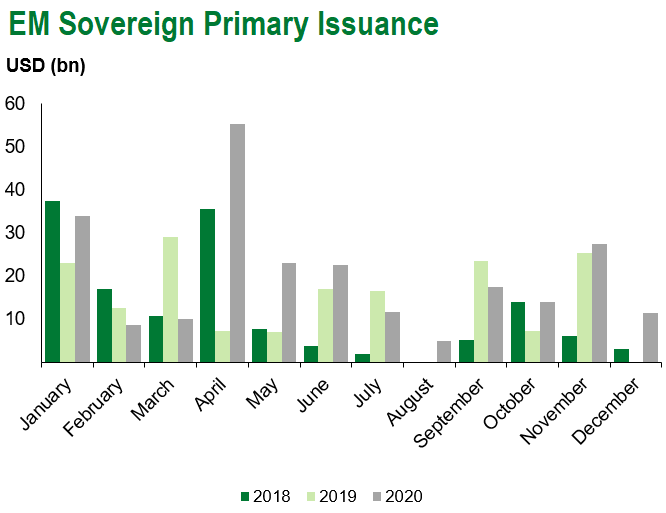
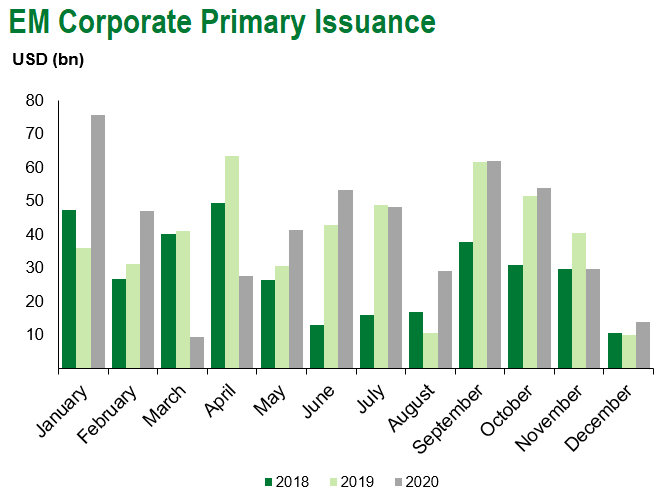
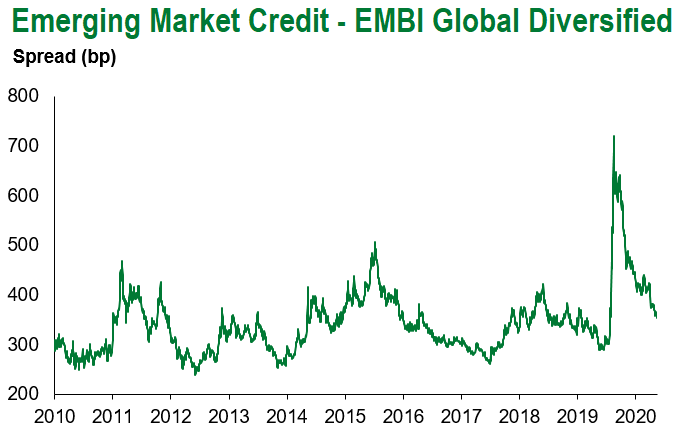
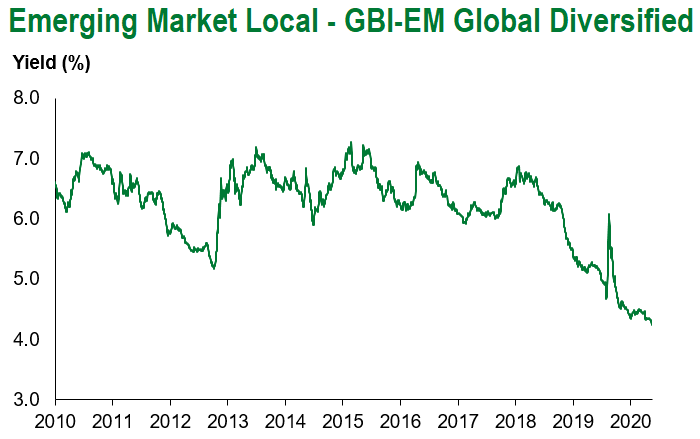
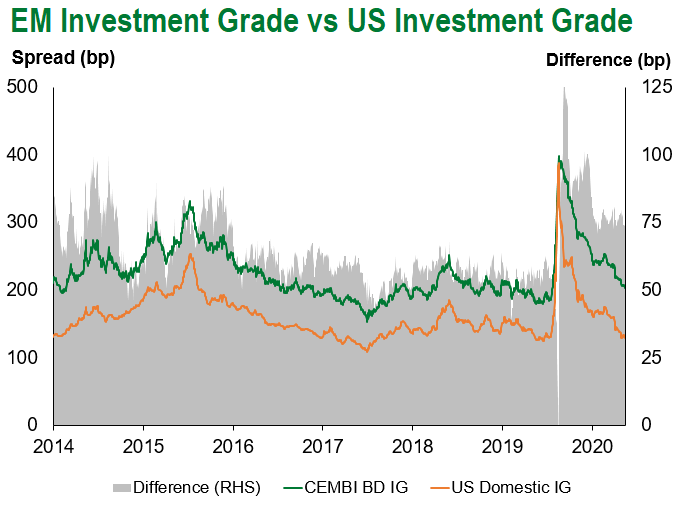
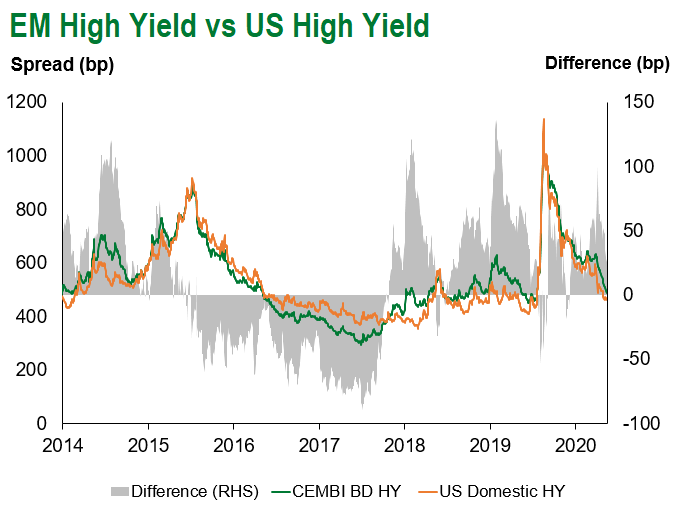
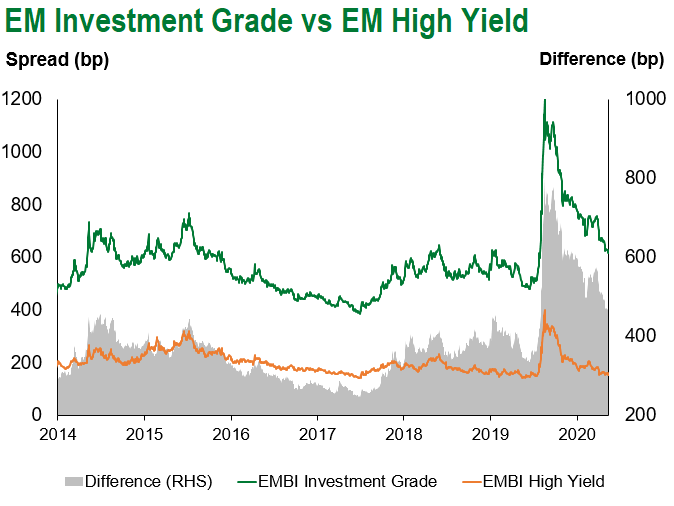
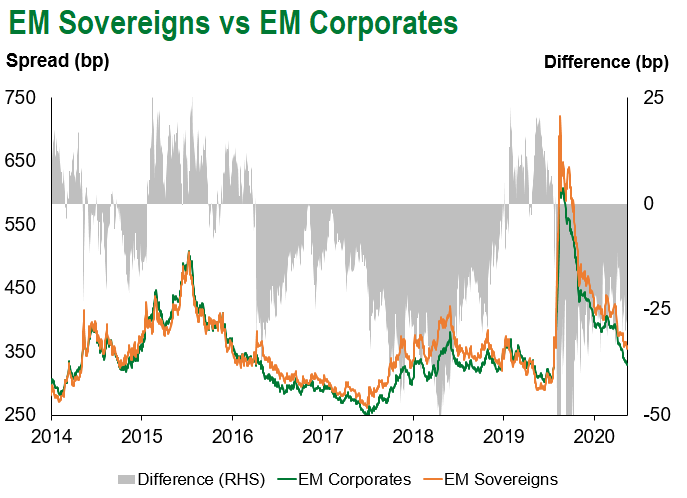
Emerging Markets Flows
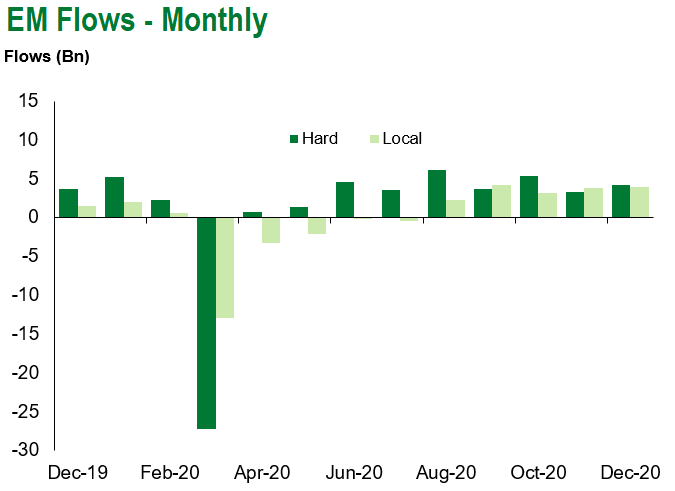
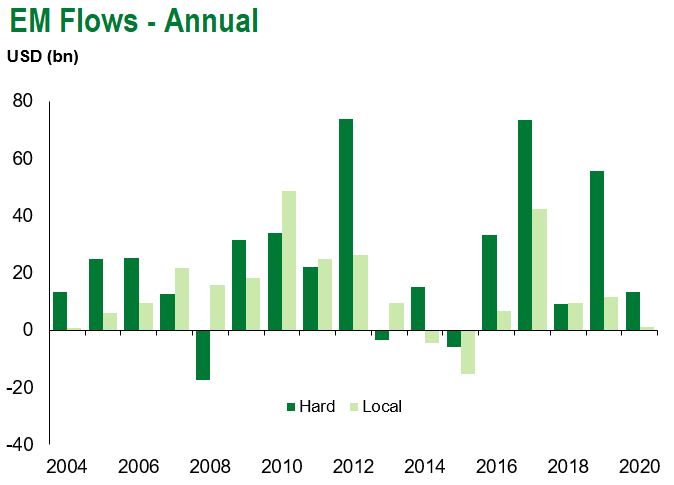
Source for graphs: Bloomberg, JPMorgan, Gramercy. As of December 18, 2020.
COVID Resources
Emerging Markets COVID-19 Case Summary
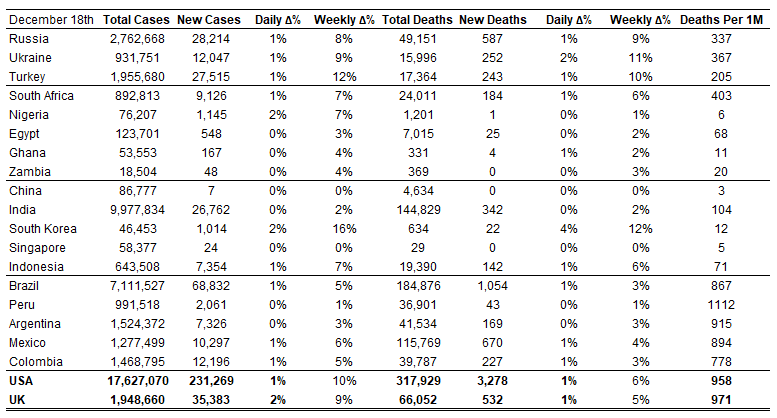
Source: Worldometer as of December 18, 2020.
Additional Crisis Resources:
Johns Hopkins COVID-19 Case Tracker
For questions, please contact:
Kathryn Exum, Senior Vice President, Sovereign Research Analyst, kexum@gramercy.com
Petar Atanasov, Senior Vice President, Sovereign Research Analyst, patanasov@gramercy.com
Tolu Alamutu,CFA, Senior Vice President, Corporate Research Analyst, talamutu@gramercy.com
James Barry, Vice President, Corporate Research Analyst, jbarry@gramercy.com
This document is for informational purposes only. The information presented is not intended to be relied upon as a forecast, research or investment advice, and is not a recommendation, offer or solicitation to buy or sell any securities or to adopt any investment strategy. Gramercy may have current investment positions in the securities or sovereigns mentioned above. The information and opinions contained in this paper are as of the date of initial publication, derived from proprietary and nonproprietary sources deemed by Gramercy to be reliable, are not necessarily all-inclusive and are not guaranteed as to accuracy. This paper may contain “forward-looking” information that is not purely historical in nature. Such information may include, among other things, projections and forecasts. There is no guarantee that any forecasts made will come to pass. Reliance upon information in this paper is at the sole discretion of the reader. You should not rely on this presentation as the basis upon which to make an investment decision. Investment involves risk. There can be no assurance that investment objectives will be achieved. Investors must be prepared to bear the risk of a total loss of their investment. These risks are often heightened for investments in emerging/developing markets or smaller capital markets. International investing involves risks, including risks related to foreign currency, limited liquidity, less government regulation, and the possibility of substantial volatility due to adverse political, economic or other developments. The information provided herein is neither tax nor legal advice. Investors should speak to their tax professional for specific information regarding their tax situation.